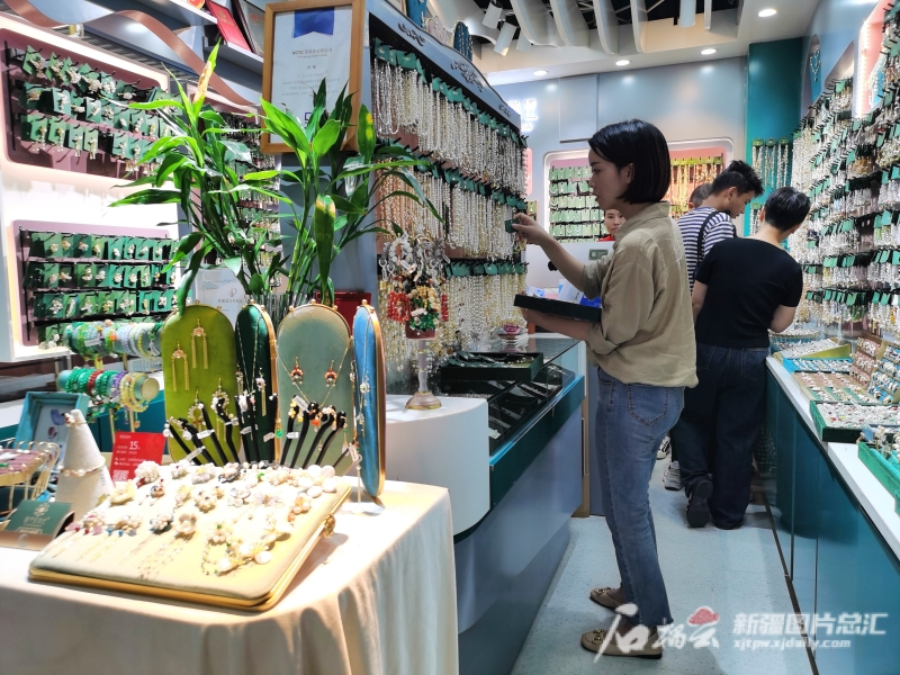Shiliuyun-Xinjiang Daily (Reporter Lu Fengbao, Chen Qiangwei) news: “I am planning to buy a batch of accessories at wholesale price here and then transport them to Hami City in northwest China's Xinjiang Uygur Autonomous Region for sale.” On August 17, 2023, Wang Chengdong from Hami selected several accessories in Yiwu International Trade Market and is planning to sell them in Hami.
In Yiwu, east China's Zhejiang Province, every day there are merchants like Wang Chengdong who come to purchase goods.
From the initial “Feathers for Candy” to the “Street Market,” and then to the small commodity market, after more than 40 years of development, goods from all over the world converge in Yiwu City. And Yiwu has transformed into the world’s largest small commodity market, known as the “World Supermarket.”
Merchants from all over the world who come to Yiwu can’t help but visit the abundant variety of goods in Yiwu International Trade Market.
Walking into Yiwu International Trade Market, countless shops are scattered throughout, like entering a huge maze. Even with occasional signs overhead and navigation apps on the phone, it is still easy to get lost and often requires asking someone for directions to proceed to the next step.

Photo shows customers select accessories at a jewelry store in the Yiwu International Trade Market in Yiwu, east China's Zhejiang Province. (Photo by Shiliuyun-Xinjiang Daily/ Lu Fengbao)
“The Yiwu International Trade Market has 75,000 shops. Even if you spend 3 minutes in each shop and calculate it based on 8 hours a day, it would take a year and a half to explore the entire market,” said Chen Xiang, the general manager of Yiwu China Commodity City Supply Chain Management Co., Ltd.
Accessories, clothing, toys, hardware... a total of 2.1 million types of goods are displayed in various areas for merchants to choose from. Some shop owners are busy restocking, some are closely monitoring screens to process orders, and some are communicating with customers.
On that day, a jewelry shop on the second floor of Zone 1 in the Yiwu International Trade Market was crowded with people. Wang Chengdong walked in, picked up necklaces, brooches, and earrings one by one, examining them carefully. As he looked, he asked the shop assistant about the wholesale prices and shipping costs of the products. “Xinjiang girls love beauty, they will definitely like these accessories,” Wang Chengdong said.
In this “World Supermarket,” besides Wang Chengdong, who came to Yiwu to seek business opportunities, there are many people from Xinjiang living and doing business here. They have become a close link between Yiwu and Xinjiang.
In the hardware section of the Yiwu International Trade Market, shop owner Ji Cansheng opened his computer to check online orders and arranged people to quickly deliver the products.
In 2009, Ji Cansheng came to Yiwu from Urumqi to sell hardware accessories in the Yiwu International Trade Market. At first, it was difficult for him to find customers, so he actively sought them out in the market. Later, he learned to find customers online, and many orders could be completed online.
After years of accumulation, Ji Cansheng’s products are now sold to South America, Europe, and other places, and his business has stabilized. “Next, I plan to sell my products in the Xinjiang market,” he said.
While walking and browsing, various products with elements of Xinjiang occasionally catch the eye.
A shop selling cardboard boxes caught our attention. Upon entering, the words “Ruoqiang Red Dates” appeared on the boxes. As we turned around, various boxes with words like Hami melon, yogurt, raisins, and naan were neatly placed on the shelves. “Merchants in Yiwu who sell Xinjiang specialties will order our cardboard boxes,” said the shop assistant He Anlun.
Leaving the Yiwu International Trade Market, the sun had already set. As the lights lit up, night life in Yiwu slowly began.
Yasen Ibrayim’s restaurant was filled with diners. He set up a canopy outside the restaurant and placed more than a dozen tables for customers to use.
Yasen was born in Xinhe County, Aksu Prefecture, northwest China's Xinjiang Uygur Autonomous Region. He was in Urumqi when he was young. Later, he heard about Yiwu’s business development from a friend. In 2004, he and his family came to Yiwu and started selling kebab.
Nearly 20 years have passed, and now Yasen operates three restaurants, and his business is growing. "I want to open 30 chain restaurants in Yiwu," said 44-year-old Yasen, with a big smile on his face, talking about his dream.
Through small wares, we can connect to a bigger world, and many people from Xinjiang are working together with people from all over China and the world in Yiwu. With their business reaching all corners, their stories are also going global in pursuing the Belt and Road Initiative.
(A written permission shall be obtained for reprinting, excerpting, copying and mirroring of the contents published on this website. Unauthorized aforementioned act shall be deemed an infringement, of which the actor shall be held accountable under the law.)









